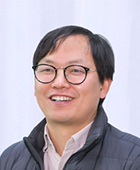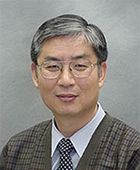
과도상태 밀링에서 시간영역 채터 시뮬레이션
Abstract
Chatter between the end mill and thin aircraft components reduces tool life and surface quality. This paper presents a time-domain chatter analysis that simulates the peripheral milling of thin aluminum plates. Peak forces and tool deformations were predicted in the time domain by simulation software written in C++. The maximum forces at various cutting depths and spindle speeds were predicted, and the stability lobe diagram was drawn in the frequency domain. The software was validated in comparison with the results of Professor Y. C. Shin’s experiments and was used to analyze the relationship between chatter and runout, number of teeth, and feed rate in virtual space. The chatter in transient state was simulated to predict the side effect of feed rate control.
Keywords:
Chatter, Stability lobe diagram, Time domain, Duhamel’s integral, Transient stateAcknowledgments
이 연구는 2018년도 경상국립대학교 연구년제 연구교수 연구지원비에 의하여 수행되었음.
References
- Youn, J. W., 2000, A Study on the Detection of Chatter Vibration using Cutting Force Measurement, J. Korean Soc. Mach. Tool Eng., 9:3 150-159.
- Hong, M. S., Kim, J. M., 2003, Generation of Turned Surface by Chattering, J. Korean Soc. Manuf. Technol. Eng., 12:3 25-30.
- Tobias, S. A., 1965, Machine-tool Vibration, Blackie & Son, Glasgow, UK.
-
Merritt, H. E., 1965, Theory of Self-Excited Machine Tool Chatter: Contribution to Machine-Tool Chatter Research-1, J. Eng. Ind., 87:4 447-454.
[https://doi.org/10.1115/1.3670861]

-
Hanna, N. H., Tobias, S. A., 1974, A Theory of Nonlinear Regenerative Chatter, J. Eng. Ind., 96:1 247-255.
[https://doi.org/10.1115/1.3438305]

- Tlusty, J., 1980, Criteria for Static and Dynamic Stiffness of Structures, Machine Tool Task Force Report, 3 8-5.
-
Tlusty, J., Ismail, F., 1981, Basic Nonlinearity in Machining Chatter, CIRP Ann-Manuf. Technol., 30:1 299-304.
[https://doi.org/10.1016/S0007-8506(07)60946-9]

- Yoon, M. C., Cho, H. D., Kim, S. K., Kim, Y. K., Cho, H. G., 2001, A Study on the Modeling and Analysis of Chatter in Turning Operation, Trans. Korean Soc. Mech. Tool Eng., 10:4 76-83.
-
Tlusty, J., Ismail., F., 1983, Special Aspects of Chatter in Milling, J. Vib. Acoust. Stress and Reliab., 105:1 24-32.
[https://doi.org/10.1115/1.3269061]

-
Montgomery, D., Altintas, Y., 1991, Mechanism of Cutting Force and Surface Generation in Dynamic Milling, J. Eng. Ind., 113:2 160-168.
[https://doi.org/10.1115/1.2899673]

-
Altintaş, Y., Budak., E., 1995, Analytical Prediction of Stability Lobes in Milling, CIRP Ann-Manuf. Technol., 44:1 357-362.
[https://doi.org/10.1016/S0007-8506(07)62342-7]

-
Jensen, S. A., Shin, Y. C., 1999, Stability Analysis in Face Milling Operations, part 1: Theory of Stability Lobe Prediction, J. Manuf. Sci. Eng., 121:4 600-605.
[https://doi.org/10.1115/1.2833075]

-
Jensen, S. A., Shin, Y. C., 1999, Stability Analysis in Face Milling Operations, part 2: Experimental Validation and Influencing Factors, J. Manuf. Sci. Eng., 121:4 606-614.
[https://doi.org/10.1115/1.2833076]

-
Seo, J. W., Park, H. W., 2015, Prediction of the Chatter during the Milling Process of the Machine Tool, J. Korean Soc. Precis. Eng., 32:5 441-446.
[https://doi.org/10.7736/KSPE.2015.32.5.441]

-
Smith, S., Tlusty, J., 1993, Efficient Simulation Programs for Chatter in Milling, CIRP Ann-Manuf. Technol., 42:1 463-466.
[https://doi.org/10.1016/S0007-8506(07)62486-X]

-
Shin, Y. C., Waters, A. J., 1998, Framework of a Machining Advisory System with Application to Face Milling Processes, J. Intell. Manuf., 9 225-234.
[https://doi.org/10.1023/A:1008825314863]

-
Campomanes, M. L., Altintas, Y., 2003, An Improved Time Domain Simulation for Dynamic Milling at Small Radial Immersions, J. Manuf. Sci. Eng., 125:3 416-422.
[https://doi.org/10.1115/1.1580852]

-
Li, H., Shin., Y. C., 2006, A Comprehensive Dynamic End Milling Simulation Model, J. Manuf. Sci. Eng., 128:1 86-95.
[https://doi.org/10.1115/1.2035694]

-
Ding, Y., Zhu, L., Zhang, X., Ding, H., 2010, A Full-discretization Method for Prediction of Milling Stability, Int. J. Mach. Tools Manuf., 50:5 502-509.
[https://doi.org/10.1016/j.ijmachtools.2010.01.003]

-
Niu, J., Ding, Y., Zhu, L., Ding, H., 2014, Runge–Kutta Methods for a Semi-analytical Prediction of Milling Stability, Nonlinear Dyn., 76 289-304.
[https://doi.org/10.1007/s11071-013-1127-x]

-
Niu, J., Ding, Y., Geng, Z., Zhu, L., Ding, H., 2018, Patterns of Regenerative Milling Chatter under Joint Influences of Cutting Parameters, Tool Geometries, and Runout, J. Manuf. Sci. Eng., 140:12 121004.
[https://doi.org/10.1115/1.4041250]


Professor in the School of Mechanical and Aerospace Engineering, Gyeongsang National University.
His research interest is CAM and CNC Machining.
E-mail: sujinkim@gnu.ac.kr

Professor in the Department of Mechanical Engineering, Purdue University.
His research interest is Laser assisted material processing.
E-mail: shin@purdue.edu